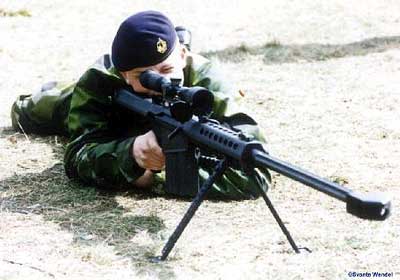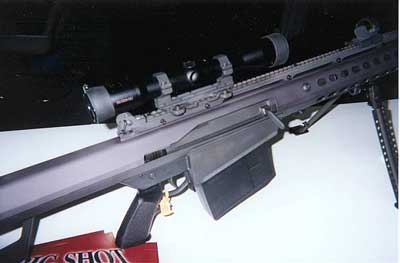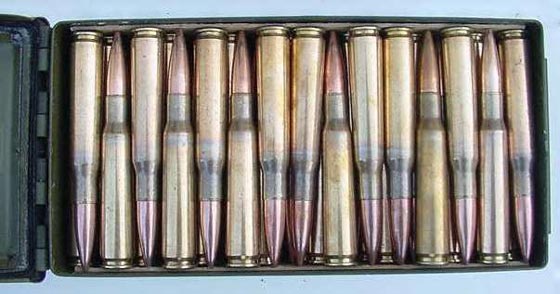
The Barrett L82A1 (military designation
XM107) .50-caliber long range rifle is semi-automatic and
is fielded to infantry soldiers and special operations personnel.
It can engage targets to 2,000 meters with precision. At
29 inches long, the frame mounted, bolt-action XM107
weighs 28.5 pounds with optics. It is manufactured by
Barrett Firearms Manufacturing, Inc. The XM107 is a
rapid-fire; man portable, shoulder-fired, recoil operated
semi-automatic system utilizing military standard .50
caliber ammunition. The primary components of the system
consist of a rifle, day optical sighting system and hard
carrying case(s).
The M107 .50 caliber long range sniper
rifle is a new Category I weapon being fielded to infantry
snipers, with 700 in service in FY2003. The Category II
M82A1 remains in service. The Army's new .50 caliber
sniper rifle design was initially designated the XM-107.
At least two manufacturers of .50 caliber sniper rifles
were in competition for the contract -- Barrett and EDM
Arms -- and Barrett won the contract.
The M107 is the Barrett Model 95, a
smaller, lightweight .50 caliber rifle with emphasis on
accuracy and durability. The bullpup design results in a
compact rifle with no sacrifice on accuracy or velocity
thanks to its cryogenically treated 29-inch (73.7 cm)
barrel, the same length as the Model 82A1. Recoil is
reduced by the dual-chamber muzzle brake and specially
designed recoil pad.
The 3-lug bolt of the M107 locks rigidly
into the barrel extension, to accommodate the widest
variety of factory ammunition loads. The adjustable bipod
may be detached by removing a single quick-release pin.
The M107 is set up to mount a variety of telescopic sights
and with good ammunition this combination usually produces
minute of Angle (MOA) accuracy. The M107 may be
disassembled for cleaning without tools. 10 round
magazines are available.
Barrett .50 caliber rifles are in
service world-wide for EOD (Explosive Ordnance Disposal)
use. Users have found that mounting the Barretts on
vehicles is a rapid and cost-effective method of clearing
military airport runways from unexploded ordnance. Others
have found the Barrett as an effective means of detonating
land mines once they have been detected.
The XM107 Long Range Sniper Rifle (LRSR)
candidate weapon was DA approved for Urgent Requirement
procurement (without night sight capability) in October
2001. The night sight capability for the XM107 LRSR was
TBD. With an armorer- level modification, the Rail Quick
Release System would allow the AN/ PVS- 10 Sniper Day/
Night sight currently used with the M24 Sniper Weapon
System to be used with the XM107 LSRS. The cost: $1,180
per set, with a BOIP of: One Sniper Team Set: Weapon base
(2); Scope Rings/ base (2); PVS-10 base (1) per XM 107
LRSR / M24 SWS.
In January 2003 the U.S. Army
Tank-automotive and Armaments Command, Armament Research,
Development and Engineering Center (TACOM-ARDEC),
Picatinny Arsenal, NJ announced an interest in acquiring
information on commercially available or non-developmental
item (NDI) suppressors that will reduce the baseline
muzzle flash, blast and sound signatures of the Army's
XM107 Caliber .50 rifle system (also commercially
available as the Barrett M82A1-M). Potential contractors
must be able to produce a minimum of 60 systems per month,
with a production surge capability to 90 systems per
month. The suppressor must be able to reduce the baseline
signatures of the XM107 without adversely affecting or
degrading weapon performance/accuracy, functionality,
recoil, safety and reliability. It must also be modular
enough to be quickly and easily installed and removed by
the operator without requiring the use of special tools
not readily available to the operator.
The .50 caliber Barrett Model 82A1/XM107
produces modest recoil energy. The weapon operating
mechanism combined with an efficient muzzle brake reduce
recoil energy to about 36 foot-pounds. The 25mm XM109
fires ammunition with essentially the same impulse as .50
caliber ammunition. However, the 25mm launches a much
heavier projectile and uses much less propellant. The
small amount of propellant limits the muzzle brake
effects. The recoil energy of the XM109 exceeds 60 foot
pounds. The suppressed version of the Model 82A1/XM107
produces significantly greater recoil energy than the
muzzle brake variant of the 82A1/XM107, and is also a good
candidate for recoil reduction efforts.
According to Operation Iraqi Freedom PEO
Soldier Lessons Learned [LTC Jim Smith 15 May 2003] "The
Barrett 50 cal Sniper Rifle may have been the most useful
piece of equipment for the urban fight - especially for
our light fighters. The XM107 was used to engage both
vehicular and personnel targets out to 1400 meters.
Soldiers not only appreciated the range and accuracy but
also the target effect. Leaders and scouts viewed the
effect of the 50 cal round as a combat multiplier due to
the psychological impact on other combatants that viewed
the destruction of the target.
"My spotter positively identified a
target at 1400 meters carrying an RPG on a water tower. I
engaged the target. The top half of the torso fell forward
out of the tower and the lower portion remained in the
tower." 325th PIR Sniper
"There were other personal
anecdotes of one round destroying two targets and another
of the target "disintegrating."
"The most pervasive negative
comment was that snipers felt the Leopold Sight was
inadequate for the weapon - that it was not
ballistically matched. It the sight was zeroed for 500,
1000 and 1500 meters, soldiers did not feel confident in
their ability to engage targets at the "between"
distances (e.g. 1300 m). Snipers felt there were better
sights available for this weapon such as the Swarovski.
Sniper team spotters felt the tripod for the Leopold
Spotter Scope could be better designed. COL Bray,
Commander, 2d BCT, 82d Airborne Division supported an
Operational Needs Statement for a Sniper Sight that would
allow the sniper to identify targets as combatants or
non-combatants out to 2000 meters."



|